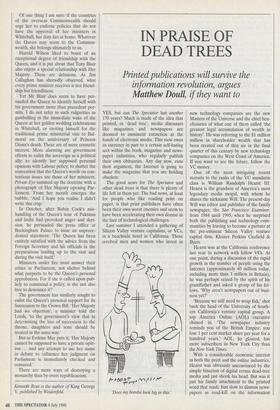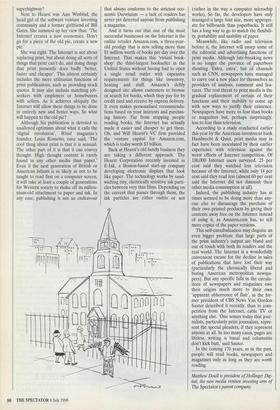IN PRAISE OF DEAD TREES
Printed publications will survive the information revolution, argues Matthew Doug if they want to
YES, but can The Spectator last another 170 years? Much is made of the idea that printed, or 'dead tree', media dinosaurs like magazines and newspapers are doomed to imminent extinction at the hands of electronic media. This view owes its currency in part to a certain self-hating sect within the book, magazine and news- paper industries, who regularly publish their own obituaries. Any day now, runs their argument, the Internet is going to make the magazine that you are holding obsolete.
The good news for The Spectator and other dead trees is that there is plenty of life left in them yet. The bad news, at least for people who like reading print on paper, is that print publishers have often been their own worst enemies and seem to have been accelerating their own demise in the face of technological challenges.
Last summer I attended a gathering of Silicon Valley venture capitalists, or VCs, in a beachside hotel in California. These cerebral men and women who invest in `Does `Does my bombe look big in this.' new technology companies are the new Masters of the Universe and the chief ben- eficiaries of what one of them called 'the greatest legal accumulation of wealth in history'. He was referring to the $1 million million in shareholder wealth that has been created out of thin air in the final quarter of this century by new technology companies on the West Coast of America. If you want to see the future, follow the VC money.
One of the most intriguing recent recruits to the ranks of the VC mandarin class is William Randolph Hearst III. Hearst is the grandson of America's most legendary media mogul, with whom he shares the nickname Will. The present-day Will was editor and publisher of the family newspaper, the San Francisco Examiner, from 1984 until 1995, when he surprised both the publishing and technology com- munities by leaving to become a partner at the pre-eminent Silicon Valley venture capital firm, Kleiner Perkins Caufield & Byers.
Hearst was at the California conference last year to network with fellow VCs. At one point, during a discussion of the rapid growth in the number of people using the Internet (approximately 40 million today, including more than 3 million in Britain), he was perhaps seized by the spirit of his grandfather and asked a group of his fel- lows, 'Why aren't newspapers out of busi- ness yet?'
`Because we still need to wrap fish,' shot back the head of the University of South- ern California's venture capital group. A top America Online (AOL) executive chimed in, 'The newspaper industry reminds you of the British Empire: you lose 1 per cent market share per year for a hundred years.' AOL, he gloated, has more subscribers in New York City than the New York Times.
With a considerable economic interest in both the print and the online industries, Hearst was obviously unconvinced by the simple binarism of digital versus dead-tree media and just shook his head. But was it just his family attachment to the printed word that made him slow to dismiss news- papers as road-kill on the information superhighway?
Next to Hearst was Ann Winblad, the head girl of the software venture investing community and a former girlfriend of Bill Gates. She summed up her view thus: 'The Internet creates a new economics. Don't go for a piece of the old pie, create a new pie.'
She was right. The Internet is not about replacing print, but about doing all sorts of things that print can't do, and doing things that print presently does badly 'better, faster and cheaper'. This almost certainly includes the more utilitarian functions of print publications, such as providing stock quotes. It may also include matching job- seekers with employers or homebuyers with sellers. As it achieves ubiquity the Internet will allow these things to be done in entirely new and better ways. So what will happen to the old pie?
Although his publication is devoted to unalloyed optimism about what it calls the `digital revolution', Wired magazine's founder, Louis Rossetto, once said, 'The cool thing about print is that it is sensual. The other part of it is that it can convey thought. High thought content is rarely found in any other media than paper.' Even if the next generation of British or American infants is as likely as not to be taught to read first on a computer screen, it will take at least a couple of generations for Western society to shake off its millen- nium-old attachment to paper and ink. In any case, publishing is not an endeavour that always conforms to the strictest eco- nomic Darwinism — a lack of readers has never yet deterred anyone from publishing a magazine.
And it turns out that one of the most successful businesses on the Internet is the online retailer Amazon.com, a three-year- old prodigy that is now selling more than $1 million worth of books per day over the Internet. That makes this 'virtual book- shop' the third-largest bookseller in the United States without having had to open a single retail outlet with expensive requirements for things like inventory, heating and staff. Amazon's deftly designed site allows customers to browse or search for books, which they pay for by credit card and receive by express delivery. It even makes personalised recommenda- tions based on your interests and purchas- ing history. Far from stopping people reading books, the Internet has actually made it easier and cheaper to get them. Oh, and Will Hearst's VC firm provided the venture capital for Amazon.com, which is today worth $3 billion.
Back at Hearst's old family business they are taking a different approach. The Hearst Corporation recently invested in E-Ink, a Boston-based start-up company developing electronic displays that look like paper. The technology works by sand- wiching tiny, electrically sensitive ink parti- cles between very thin films. Depending on the current that passes through them, the ink particles are either visible or not (rather in the way a computer microchip works). So far, the developers have only managed a large font size, more appropri- ate for billboards than paperbacks. It still has a long way to go to match the flexibili- ty, portability and usability of paper.
Meanwhile, like radio and television before it, the Internet will usurp some of the editorial and advertising functions of print media. Although late-breaking news is no longer the province of paperboys shouting 'Extra, extra', but of channels such as CNN, newspapers have managed to carve out a new place for themselves as providers of analysis, comment and fea- tures. The real threat to print media is the gradual replacement of certain of their functions and their inability to come up with new ways to justify their existence. Newspapers have more to fear than books or magazines but, perhaps surprisingly, less to fear than television.
According to a study conducted earlier this year by the American investment bank Hambrecht & Quist, print media may in fact have been inoculated by their earlier experience with television against the worst effects of Internet competition. Of 100,000 Internet users surveyed, 25 per cent said they watched less television because of the Internet, while only 14 per cent said they read less (almost 60 per cent said the Internet did not diminish their other media consumption at all).
Indeed, the publishing industry has at times seemed to be doing more than any- one else to discourage the purchase of their own printed products by giving their contents away free on the Internet instead of using it, as Amazon.com has, to sell more copies of the paper versions.
This self-cannibalisation may disguise an even bigger problem: that large parts of the print industry's output are bland and out of touch with both its readers and the real world. The Internet is, a wonderfully convenient excuse for the decline in sales of publications that have lost their way (particularly the chronically liberal and boring American metropolitan newspa- pers). But any specific falls in the circula- tions of newspapers and magazines owe their origins much more to their own `apparent abhorrence of flair', as the for- mer president of CBS News Van Gordon Sauter described it recently, than to com- petition from the Internet, cable TV or anything else. 'One senses today that jour- nalists, particularly print journalists, repre- sent the special pleaders, if they represent anyone at all. In too many cases, pages are lifeless, writing is banal and columnists don't kick butt,' said Sauter.
In the coming 170 years, as in the past, people will read books, newspapers and magazines only as long as they are worth reading.
Matthew Doull is president of Hollinger Dig- ital, the new media venture investing arm of The Spectator's parent company.















































































































 Previous page
Previous page